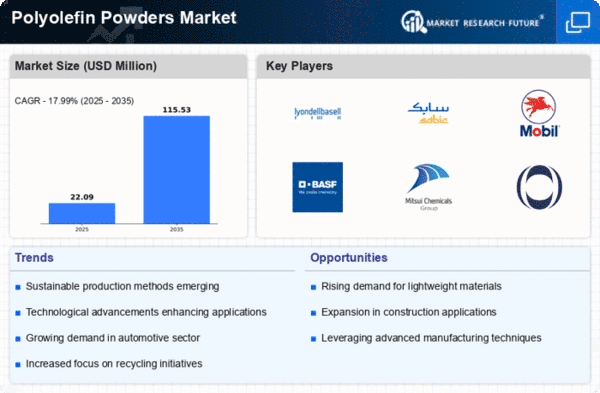Top Industry Leaders in the Polyolefin Powders Market
 The polyolefin powders market is a dynamic space marked by constant evolution and fierce competition. Key players vie for market share by employing diverse strategies tailored to specific applications and end-use industries. Let's delve into the current competitive landscape, exploring factors influencing market share, noteworthy industry news, and recent developments shaping the sector.
The polyolefin powders market is a dynamic space marked by constant evolution and fierce competition. Key players vie for market share by employing diverse strategies tailored to specific applications and end-use industries. Let's delve into the current competitive landscape, exploring factors influencing market share, noteworthy industry news, and recent developments shaping the sector.
Market Share Strategies:
-
Product Innovation: Leading players like Chevron Phillips Chemical Company Inc., SABIC, and LyondellBasell Industries are focusing on innovative powder formulations with enhanced properties like improved flowability, heat resistance, and UV stability. This caters to specific industry needs and expands market reach. -
Vertical Integration: Integration across the value chain, from feedstock production to powder processing, grants companies cost advantages and control over quality. Companies like Borealis AG and Reliance Industries Ltd. are actively pursuing this strategy. -
Regional Expansion: Emerging markets in Asia Pacific and Latin America present significant growth potential. Companies like Formosa Plastics Corporation and Lotte Chemical Corporation are aggressively expanding their footprint in these regions to capture new market share. -
Sustainability Focus: The crescente focus on sustainability is leading to investments in bio-based polyolefin powders and recycling technologies. Companies like Evonik Industries AG and Braskem S.A. are at the forefront of these developments. -
Strategic Partnerships: Collaborations with research institutes, equipment manufacturers, and downstream players are fostering innovation and market penetration. BASF SE and Dow Inc. are notable examples of companies actively pursuing partnerships.
Factors Influencing Market Share:
-
Application Diversity: The versatility of polyolefin powders in applications like rotomolding, coatings, masterbatches, and composites creates a complex market landscape. Companies with strong portfolios catering to diverse needs hold an advantage. -
Technological Advancements: Advancements in powder processing and rotomolding technologies open up new avenues for application and product differentiation. Companies investing in R&D to capitalize on these trends gain an edge. -
Regional Economic Trends: Fluctuations in regional economic growth and raw material prices can impact demand and influence market share dynamics. Companies with geographically diversified operations are more resilient to these fluctuations. -
Regulatory Landscape: Stringent environmental regulations, particularly in Europe and North America, are driving demand for sustainable polyolefin powders. Companies with compliant or bio-based product offerings hold an advantage.
Key Players
- LyondellBasell Industries Holdings BV (Netherlands),
- Exxon Mobil Corporation (US),
- INEOS (UK),
- Merck KGaA (Germany),
- SABIC (Saudi Arabia),
- Borealis AG (Austria),
- Eastman Chemical Company (US),
- Axalta Coating Systems (US),
- Wacker Chemie AG (Germany),
- Mitsui Chemicals, Inc. (Japan),
- Asahi Kasei Corporation (Japan),
- and Sumitomo Seika Chemicals Co., Ltd (Japan).
Recent Developments :
March 2023: A consortium of leading polyolefin powder manufacturers forms an industry association to promote best practices and address sustainability challenges.
April 2023: Rising crude oil prices lead to an increase in raw material costs, putting pressure on polyolefin powder producers and potentially impacting market prices.
May 2023: A breakthrough in rotomolding technology allows for the use of thinner polyolefin powder walls, opening up new opportunities for lightweight and fuel-efficient product designs.










